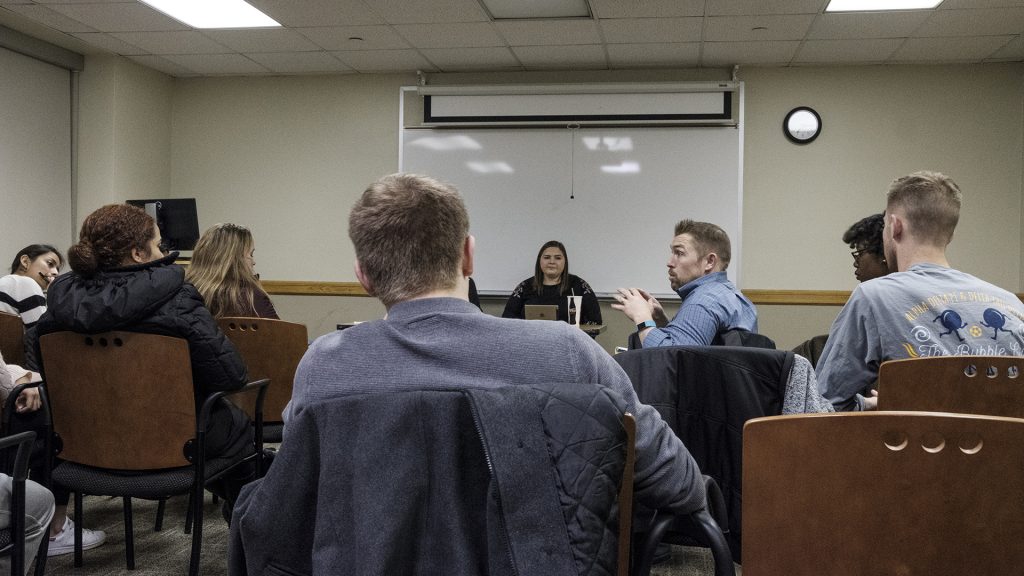Increased education and awareness dominated town-hall conversation on sexual assault.
By Sarah Watson
sarah-e-watson@uiowa.edu
A diverse group of campus advocates attended University of Iowa Student Government’s third town hall to discuss sexual assault Wednesday in the IMU.
Topics that dominated the conversation were more education about sexual assault, how to help those affected, and how the UI’s system works.
“Students have a lot to learn about this issue,” UISG President Jacob Simpson said. “Compared to our other town halls, I think we had more questions than comments, and I was really thankful we had representatives … to answer those questions.”
Rape Victim Advocacy Program representatives, Sexual Misconduct Response Coordinator Monique DiCarlo, and Monsoon representatives were all available to answer students’ questions.
A few of the proposals floated were more training for the average individual, creating an identification system so students could identify faculty and staff that had been trained how to respond to sexual assault, and more education for students of different cultures.
One idea proposed that DiCarlo said she would take back with her in her work was an idea about education for family and friends of survivors.
“The idea of doing a program for friends and family who are impacted. That’s in the current anti-violence plan of the Women’s Resource and Action Center,” DiCarlo said. “I’m excited to go back and tell the folks there that students would like to see more programming about how to help a friend.”
Another topic question discussed was the process of how students could report a complaint and how effective the process was for students.
A student can report an incident of sexual misconduct in a variety of ways online, over the phone and in person.
From there, DiCarlo said, the report, if filed as a complaint, can go through stages of an investigation, hearing, and appeal.
“I don’t want to paint it as a scary process; challenges are different for everyone, but I think the length of time is challenging no matter where people are with healing,” DiCarlo said. “The waiting is tough.”
This process is one that Secretary of Education Betsy DeVos proposed to revise in a speech given in early September when she argued that the Title IX and “Dear Colleague” letter let higher-education institutions overstep its boundaries and forget the rights of the accused in deciding on cases of sexual misconduct.
On Sept. 22, DeVos lifted the guidance, allowing campuses to now use a higher standard of “clear and convincing evidence” regarding sexual assault.
The Office of Sexual Misconduct Response Coordinator posted in October that after reviewing the changes, it did not think the new guidance from the Education Department would change the UI policies.
“We believe in due-process rights,” DiCarlo said. “We are working hard not to pit due process against safety. Fair process is about safety.”
Another topic of discussion included resources for different populations of students.
Yanning Chen is an employee of Monsoon, which provides services for victims of domestic violence and assault in Asian and Pacific Island communities in Iowa.
She helps conduct healthy relationship workshops for Asian and Pacific Island students at the international student Orientation Week at the UI to give them a safe space to talk about sex, consent, and healthy relationships. But she said she would like to see more.
“For some cultures, there’s no word for rape or sexual assault, so it’s really hard for them to understand,” Chen said.
Simpson said he agreed.
“We need to assess on campus how well we support students from different cultures,” Simpson said.



